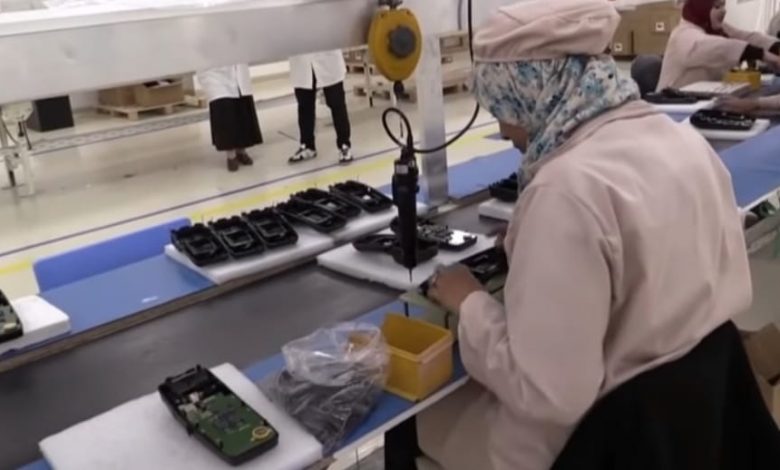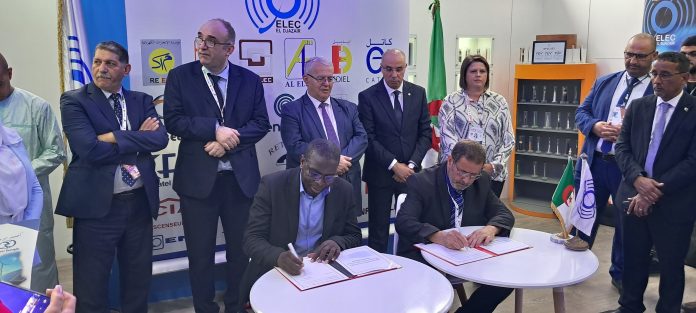| Discover Algeria | About us | Press area | Contact | ||||||||
|
-
Legal INVEST
Les derniers textes juridiques
View more
Les interviews By AlgeriaInvest
-
last interview New
-
All interviews
Last Interview
Newsletter
Subscribe to the economic newsletter
- Business Environment
- Agence Algérienne de promotion de l'inve...
- Fond National de l’Investissement "FNI"
- Conseil National de l’Investissement "CN...
- Direction Générale de la Promotion de l’...
- Directions de l’Industrie et des Mines d...
- Agence Nationale d’Intermédiation et de...
- Haute commission nationale des recours l...
- Business Opportunities
NEW OPPORTUNITIES
- News
NEW NEWS
- Our Services
-
May 13, 2025 | 3 months ago
Sharing
The electronics industry, a sector in the making
Besides guaranteeing efficiency and transparency, digital transformation is seen as a breath of fresh air for players in the electronics manufacturing sector, who will have the opportunity to generate profits and increase their market share.

ENIE back in the spotlight
This is the case of the Entreprise Nationale des Industries Electroniques (ENIE) (National Company for Electronic Industries), which is preparing to "launch the production of two million electronic tablets for more than 8,800 educational establishments throughout 2025", declared its CEO, Mohamed Abbès Bourassi, recently. The move is part of the national strategy of the President of the Republic, Abdelmadjid Tebboune, to use new technologies and digitisation to promote the establishment of a resilient ecosystem. All the more so as the national digitisation strategy for the period 2024-2029 aims to accelerate the widespread use of new technologies within public administrations and strengthen coordination between ministerial departments.
Although the company had previously supplied similar equipment during 2022 and 2023, this new order will benefit it in every way. Assuming that an order, whether large or small, is crucial to a company, the new workload plan will enable ENIE to manage its resources efficiently, optimise its operations and turn around its financial situation. The production of two million tablets can boost business activity and create a positive dynamic, as the company begins to attract more customers thanks to its improved economic health. ENIE, the flagship of the country's technology industry, is on the up again. It now wants to make a strong entry into the national market and regain its former position in a field in which it has in-depth knowledge, expertise and recognised industrial know-how. Successfully delivering such an order can enhance its reputation and brand image, opening up new opportunities.
The local integration rate has reached 30%.
In addition to tablets and smartphones, the company is also working to
manufacture electronic payment terminals (EPTs), with an estimated annual
production capacity of 250,000 terminals. There are also plans to produce
consumer electronics, in particular televisions. The production of two million
tablets can catalyse innovation and capacity enhancement. The order will help
the company get on track for the next stage, aimed at regaining a significant
share of the national market by adopting new methods, optimising its supply
chain, and investing in more efficient resources. By meeting the Ministry of
Education's needs or the requirements of other customers, the company can
create lasting alliances, contributing to its long-term resilience.
With this in mind, the head of ENIE pointed out that the local integration rate had reached 30%, while expressing his company's willingness to enter into international partnerships to increase this rate over time. Mohamed Abbès Bourassia also expressed his company's willingness to "resume local production of smartphones as soon as the specifications for this industry are promulgated", adding that "the forthcoming introduction of fifth-generation technology will enable the company to manufacture devices suitable for the Internet of Things".
Sharing
Popular Articles






















